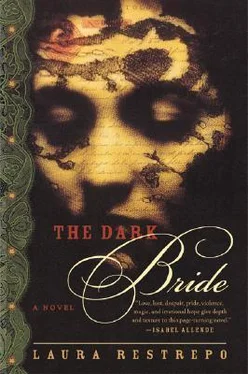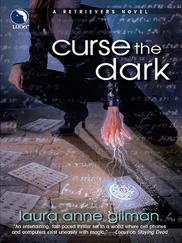“Did she eat ants too?” The idea seemed hilarious to señorita Rosalba. “Maybe out of sight from her husband the little devil would stuff herself with ants! And why not, since up around Santander even the whites like ants roasted with salt. I remember that Matildita used to complain often about not being able to fry terecay turtles in oil. Matildita was also a bit of a scoundrel, and while everyone saw her as so self-sacrificing and submissive, she had her own character, she pitched fits and gave in to her habits, so while she may have prepared civilized food for her clients, she preferred for herself and her children wild yucca, sweet potatoes, yams, and red pepper, which are pig slop for white men and delicacies in the mouths of Indians.”
“She was endlessly working to keep her house and the restaurant in order, and besides cooking, she wove cotton and made cloth to dress her children and herself.”
“Don’t exaggerate, Julio, remember she was dirty and kept her children naked. She sent the eldest, the boy, to school, but not the girls, because she made them work,” says the señorita critically, and I imagine Sayonara and her sisters running around the place. I see them with their own faces and their long hair, but with the bodies of lizards, of cats, of dragonflies; dirty and illiterate, peeling potatoes and scrubbing dishes, as señorita Rosalba testifies, but agile and free, indomitable, capricious, and foul-mouthed.
“Hush, woman, don’t say evil things,” señor Mantilla reprimands his sister. “Don’t disparage her soul. Besides, as if that weren’t enough, doña Matildita was skillful at weaving baskets, mats, and hammocks, and by that I want to tell you, señora journalist, that she produced a lot of income for don Abelardo and no expense. And in his own coarse, rustic way he realized that; he set himself up with her and kept her as his only woman until the end.”
The couple’s daughters, the Mantillas tell me, were all thin like their mother, with dark, opulent hair, almond-shaped eyes, and skin the color of fired bricks. The oldest child and only male was more like his father, with light blue eyes, lighter hair, and barely tanned skin, but he stuck to his mother with such devotion that as a young boy don Abelardo threatened to send him to an orphanage if he didn’t let go of her skirts and act his age. You’re a man and you’re white, he kept telling the boy, so don’t go around sniveling.
“That boy, who was given the name Emiliano,” says the señorita, “was the light of Matilde’s eyes, her reason for being. The only luxury she permitted herself in that valley of tears was loving and taking care of that boy as if he were a real live prince, and she would have given her very life for him, as they say, only that in her case that’s exactly what happened.”
When he turned eighteen, Emiliano was caught in an army roundup and was enlisted as a recruit in the Third Brigade. Military life wasn’t a bad choice and don Abelardo was satisfied that his pup would be given the opportunity to progress in the arms race. Doña Matildita resented it, because it took the object of her devotion from her side and at the same time deprived her of his help, because the boy was her right hand in the innumerable chores of Los Tres Amigos. Since his military service would be short and nothing would be gained by protesting, Matildita relented, saying that at least those fools should teach you how to write, and the day he left she caressed his face, a rare gesture for her, a woman who didn’t know anything about such things, and she kept saying over and over, so it would be etched into his soul: Never forget that you are hiwi ; don’t let them treat you like an animal. In spite of their prejudices, at first things were tolerable, because the brigade’s close proximity allowed the boy to stop by the restaurant frequently to see his parents and because doña Matilde secretly managed daily to send him a basket filled with food.
“But it is customary for officers and superiors to humiliate the recruits,” señor Mantilla tells me, “and Emiliano was a man of rebellious pride. There was a sergeant who was more cruel than the others, that sergeant treated him brutally and shouted in his face: ‘What can you learn, you’re the son of a savage,’ and he ridiculed the boy in front of the others, calling him the son of Tarzan and Cheetah. Until Emiliano, who was tall and strong, chose not to swallow any more humiliation and split open the sergeant’s face with a powerful punch.”
As punishment they took his clothes and buried him in a jail they called the tomb, a hole in the ground, lined with cement, deep and narrow, covered on top by a steel grate that left the prisoner exposed to the rain, which in this region is frequent, to the cold nights and to the sun’s burning rays. “You’re going to rot there, monkey, savage, humanoid,” shouted the sergeant from above as he passed Emiliano, and so did other officers, spitting on him and insulting him: “Don’t even dream that we are going to let you out. Why don’t you just die and take advantage of already being buried.”
Don Abelardo’s attempts to secure his release were futile, as were the pleas of Matildita, who abandoned her duties, forgot about her daughters, and planted herself day and night in front of the entrance to the brigade, where she cried from the top of her lungs and begged for clemency from all the officers she saw coming and going.
In that hole of death, Emilano wallowed in dementia and his own excrement. He was riddled with fungus and larvae and perhaps managed to calm his hunger and anguish by eating ants and worms as he had seen his mother do. And he endured being spit upon by the Heroes of Chimborazo and urinated upon by the Pumas of the Andes. Could he at least see the moon from his dungeon? Yes, he could: the moon, the stars, and any meteor that passed compassionately over his head, and they say that he spent his nights as a prisoner in the bowels of the earth, penetrating, with his gaze and his desire, the deep bowels of the firmament. According to the Mantillas, you could hear his voice repeating: “ Soy hiwi, ” I am a man, I am a man, sometimes softly, sometimes in prayer, and other times shouting clearly so he wouldn’t forget that he was a man and not filth, that he was a living being and not a cadaver. A cadaver that rebels, that wants to ignore his own decomposition, that abhors the earth that weighs upon him?
“That is what he had become,” confirms the señorita.
He managed to survive for forty-six days, stolen minute by minute from horror and death, and on the night of October 17, beneath the miserly moonlight that refused to illuminate him, he cut his veins with a piece of broken glass and agonized until dawn, when his condition was discovered by the cleaning personnel. Then they opened the steel grate and disinterred him, but he was no longer saying hiwi or anything else, and he arrived at the infirmary with his heart drained of its blood and still, finally truly dead after having been dead for so long in life.
When they came to tell her what had happened, doña Matildita, who was barefoot and still hadn’t braided her hair, was lighting the stove as she did every day at that hour, drenching the coal with liquid fuel before lighting it with a match. The bearers of the news hadn’t finished saying what they had come to say before she took off running up the highway with the gallon of fuel in her hand, and in front of the brigade she upturned it on herself and lit a match. Her hair was the first thing to burn, that sumptuous blue-black mantle that had been her only excess; it glowed red-white like a torch against the innocence of the sky until her lean body of dry wood was engulfed in flames. Her eyeballs melted and the intense fire of a mother’s mourning began, the combustion of her infinite pain that wasn’t of the flesh, and by the time the soldiers had put out the fire, her being had already been turned into a miserable heap of bereaved coals.
Читать дальше












